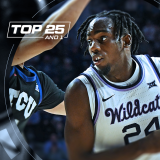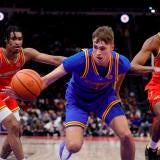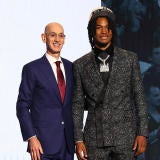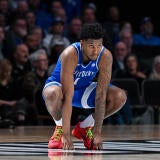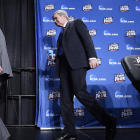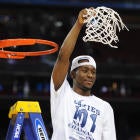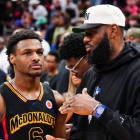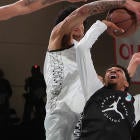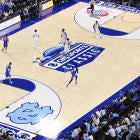Not long after the report from Yahoo! Sports published early Friday, and many of the nation's top college basketball programs were alleged to have used student-athletes on the take to win games, some as recently as this week, NCAA president Mark Emmert released a statement about his committee because of course he released a statement about his committee.
"Following the Southern District of New York's indictments last year, the NCAA Board of Governors and I formed the independent Commission on College Basketball, chaired by Condoleezza Rice, to provide recommendations on how to clean up the sport," Emmert said. "With these latest allegations, it's clear this work is more important now than ever. The Board and I are completely committed to making transformational changes to the game and ensuring all involved in college basketball do so with integrity. We also will continue to cooperate with the efforts of federal prosecutors to identify and punish the unscrupulous parties seeking to exploit the system through criminal acts."
Cut to me rolling my eyes.
Let me make this clear: As long as the NCAA holds tight to the concept of amateurism, and denies student-athletes the ability to secure representation, or accept fair-market value, this black market that could potentially sully the names of multiple Hall of Famers, and theoretically lead to blue bloods playing with reduced rosters as early as this weekend, will never go away no matter how many smart people are placed on a committee. That's a fact. And until Emmert, and the people who control Emmert, acknowledge this fact, and address it in a meaningful way, student-athletes -- especially those with identifiable talents that suggest they could soon be worth millions of dollars -- will forever have people trying to give them things in violation of NCAA rules for any number of reasons. And, obviously, lots and lots of them will be happy to accept those things.
It's a story both as old as time and as current as today considering the FBI has reportedly secured documents indicating South Carolina's Brian Bowen, USC's Bennie Boatright and Chimezie Metu, Texas' Eric Davis, Michigan State's Miles Bridges, Duke's Wendell Carter, Alabama's Collin Sexton and Kentucky's Kevin Knox have violated NCAA rules. The documents, obtained via a raid of the offices of longtime sports agent Andy Miller, suggest each of those current players, or one of their immediate family members, accepted cash or meals or something from Miller or somebody working for Miller.
"And the scary part about this whole FBI probe is that Andy Miller is not the only agent who conducts his business in this manner," one Division I coach texted me Friday morning. Which is obviously true, if only because if Miller were the only agent conducting his business in this manner, he would've probably had a better list of clients or actually gotten every player he allegedly paid.
(Note: He didn't.)
The fix really is simple. What the NCAA should do is eliminate the black market by allowing student-athletes to secure representation and accept fair-market value in this billion-dollar industry where just about everybody connected to the biggest sports in the biggest conferences are legally getting rich but them.
Want agents to stop paying players illegally?
Cool.
Then make it legal.
Just change the rules so that any student-athlete can sign a legal and binding agreement with an agent, at which point the agent is free to provide whatever he wants to the student-athlete. Suddenly, literally overnight, the days of agents and financial advisors working through assistant coaches at places like Auburn and USC would be over because it would be unnecessary. Agents could instead work openly and directly with players and their families just like they do in the entertainment world when teenagers worth millions of dollars emerge.
If everybody agrees it was smart for 14-year-old "America's Got Talent" winner Grace VanderWaal to have an agent the moment it was clear she was a future multimillionaire, can't we also agree 19-year-old Collin Sexton should be allowed to have one, if he wants, the moment it's also clear he's a future multimillionaire? Of course we can. Or at least we should. Because that rule-change alone would eliminate much of this "scandal" that's dominated headlines for months, which is among the reasons the NCAA would be wise to adopt it.
Now to amateurism.
Like I've said and written many times, amateurism might've made sense back when television networks weren't paying billions of dollars for the rights to broadcast college events. Or when fans weren't paying thousands of dollars to attend games. Or when coaches weren't making $8 million a year. Or when the No. 1 pick in the NBA Draft, often a 19-year-old coming off of one year of college, wasn't guaranteed to sign a two-year contract worth $14.6 million three months after the NCAA Tournament ends.
But those were different days.
In this era of college athletics, the best student-athletes in the prominent sports are worth too much money to too many people. They're worth something to agents who want to represent them. They're worth something to financial advisors who want to handle their money. They're worth something to shoe companies that want the universities with which they have multimillion-dollar business deals to succeed. They're worth something to schools that want to sell season-ticket packages for the most money possible. They're worth something to coaches who want to get contract extensions that set them up for life. They're worth something to boosters who just want, sometimes irrationally, their favorite teams to win big and consistently.
It's impossible to disagree with any of those statements.
And what that means is that there are countless student-athletes, every year, that have actual value well above what they're allowed to accept per NCAA rules. Thus, a black market is created where agents, financial advisors, shoe companies, coaches, boosters and others often try to create an advantage by circumventing NCAA rules. That's how we got here.
So how do we get out of here?
Kill amateurism.
Amateurism is an outdated principle flawed to its core in any system where everybody gets rich except for the competitors, which is something the Olympics figured out a long time ago despite some insisting that allowing athletes to accept fair-market value would ruin everything. Needless to say, those people were wrong -- evidence being that more than 20 million folks watched multimillionaire Lindsey Vonn ski down a mountain the other night while chanting "USA! USA! USA!" Nobody cares that she's properly-compensated.
College athletes should be properly-compensated too.
And, obviously, that means different things for different people. So, as with everything else in this country, the NCAA should allow the market to decide exactly who gets what. For example, if Nike wanted to sign Marvin Bagley to a $2 million endorsement deal in exchange for him enrolling at Duke, and Bagley, after entertaining all other offers, wanted to accept it, let him do it. Similarly, if a car dealership in Birmingham wanted to sign Chris Cokley to a $5,000 endorsement deal in exchange for him enrolling at UAB, and Cokley, after entertaining all other offers, wanted to accept it, let him do it. Just let student-athletes -- and I mean all student-athletes, male and female, from football players to volleyball players and everybody in between -- take whatever somebody is willing to give them for whatever reason. Make it legal. Do that and suddenly, literally overnight, everything would be above board. And we'd never again have to wonder why this player went to this school or that player went to that school. It would all be transparent. Some players would get a lot. Some players would get a little. Some players would get nothing more than the scholarship they already get.
In other words, everybody would get what they're worth.
And, yes, I know this would lead to businesses often recruiting for schools of their choosing -- and definitely lead to a situation where, say, Core Laboratories might let it be known that any top-50 point guard, or top-20 running back, who signs with Texas A&M is promised an endorsement deal of some sort. And that similar deals would emerge all over the country at all levels.
To that, I say ... fine with me!
All that would mean is that student-athletes are getting whatever the market says they're worth just like Olympians get whatever the market says they're worth. And to those who are yelling, "But that's a system that would lead to the biggest schools with the biggest corporate sponsors and most intense boosters getting most of the best prospects," let me ask: Have you checked the recruiting rankings lately? The biggest schools with the biggest corporate sponsors and most intense boosters already get most of the best prospects. Kentucky already has a recruiting advantage over Western Kentucky. Tennessee already has a recruiting advantage over Middle Tennessee. So this system wouldn't change the order of things within the sport at all. The schools that are good at basketball now would be good then. The schools that are good at football now would be good then. The recruiting rankings, and AP polls, wouldn't annually look much different.
The same schools would win the championships.
And here's the best part: Everything would be clean!
Because, try to follow me here, you can't break amateurism rules if there are no amateurism rules. Which is why doing away with amateurism is the only actual fix on the table. Everything else just leads to a pointless press release. And if Mark Emmert and his committee are too foolish to realize that, any attempt they make to "clean up the sport" will fail spectacularly. Just like always.




